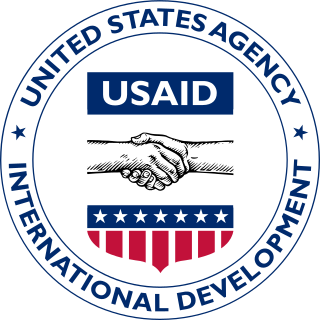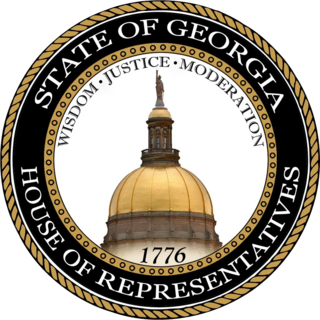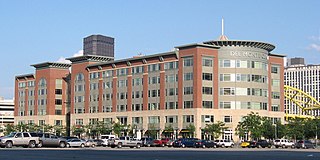Related Research Articles

The United Nations Industrial Development Organization (UNIDO) is a specialized agency of the United Nations that assists countries in economic and industrial development. It is headquartered at the UN Office in Vienna, Austria, with a permanent presence in over 60 countries. As of April 2019, UNIDO comprises 170 member states, which together set the organization's policies, programs, and principles through the biannual General Conference.

The World Intellectual Property Organization is one of the 15 specialized agencies of the United Nations (UN). Pursuant to the 1967 Convention Establishing the World Intellectual Property Organization, WIPO was created to promote and protect intellectual property (IP) across the world by cooperating with countries as well as international organizations. It began operations on 26 April 1970 when the convention entered into force. The current Director General is Singaporean Daren Tang, former head of the Intellectual Property Office of Singapore, who began his term on 1 October 2020.

The United States Agency for International Development (USAID) is an independent agency of the U.S. federal government that is primarily responsible for administering civilian foreign aid and development assistance. With a budget of over $27 billion, USAID is one of the largest official aid agencies in the world and accounts for more than half of all U.S. foreign assistance—the highest in the world in absolute dollar terms.

The Georgia House of Representatives is the lower house of the Georgia General Assembly of the U.S. state of Georgia. There are currently 180 elected members. Republicans have had a majority in the chamber since 2005. The current House Speaker is Jon G. Burns.
Local government in the United States refers to governmental jurisdictions below the level of the state. Most states and territories have at least two tiers of local government: counties and municipalities. Louisiana uses the term parish and Alaska uses the term borough for what the U.S. Census Bureau terms county equivalents in those states. Civil townships or towns are used as subdivisions of a county in 20 states, mostly in the Northeast and Midwest.
Bernard F. Kenny Jr. is an American Democratic Party politician, who represented the 33rd Legislative District in the New Jersey State Senate from 1993 to 2008, after serving in the New Jersey General Assembly from 1988 to 1993. He served for one day at the end of his tenure in the Senate as President of the Senate.

Pittsburgh Regional Transit is the second-largest public transit agency in Pennsylvania and the 20th-largest in the United States. The state-funded agency is based in Pittsburgh and is overseen by a CEO and a nine-member board of unpaid volunteer directors, five of whom are appointed by the county executive and approved by the county council; and one each by the majority and minority leaders by each political party. After operating as the Port Authority of Allegheny County for most of its history, the agency rebranded under its current name in June 2022. In 2021, the system had a ridership of 27,975,600.

The Regional Transportation Authority (RTA) is the financial and oversight body for the three transit agencies in northeastern Illinois; the Chicago Transit Authority (CTA), Metra, and Pace, which are called Service Boards in the RTA Act. RTA serves Cook, DuPage, Kane, Lake, McHenry and Will counties.
The administrative divisions of Virginia are the areas into which the Commonwealth of Virginia, a U.S. state, is divided for political and administrative purposes. Some are local governments; others are not. However, all local governments are political subdivisions of the state.
Robert W. O'Donnell is an American Democratic Party politician who is a former Speaker of the Pennsylvania House of Representatives.

The year 1948 marked the beginning of the institutionalised modern European integration. With the start of the Cold War, the Treaty of Brussels was signed in 1948 establishing the Western Union (WU) as the first organisation. In the same year, the International Authority for the Ruhr and the Organization for European Economic Co-operation, the predecessor of the OECD, were also founded, followed in 1949 by the Council of Europe, and in 1951 by the European Coal and Steel Community, with the ensuing moves to create further communities leading to the Treaty of Rome (1957)
A municipal authority is a form of special-purpose governmental unit in Pennsylvania. The municipal authority is an alternate vehicle for accomplishing public purposes without the direct action of counties, municipalities and school districts. These purposes commonly include the acquisition, financing, construction and operation of projects such as water supply and sewer systems, airports, transit systems, parking garages, flood control systems, parks, and similar entities. An authority may fix and collect rentals or other charges and may issue revenue bonds. A board appointed by the establishing government or governments governs each authority.
Pennsylvania Department of Community and Economic Development is a cabinet-level state agency in Pennsylvania. The mission of the department is to enhance investment opportunities for businesses and to improve the quality of life for residents. The department works to attract outside corporations, spur expansion of existing local employers, and foster start-ups by providing tax incentives and technical assistance. Additionally, the agency provides grant funding to community groups and local governments for projects such as revitalizing "Main Street" infrastructure, enhancing low income housing availability, or improving access to technology.

The Stadium Authority of the City of Pittsburgh is a municipal authority that was charged with the construction of Three Rivers Stadium and the management of the land on which it stood following its 2001 demolition.

The Government of Pittsburgh is composed of the Mayor, the City Council, and various boards and commissions. Most of these offices are housed within the Pittsburgh City-County Building. The Government of Pittsburgh receives its authority from the Pennsylvania General Assembly pursuant to Part III of Title 53 of the Pennsylvania Consolidated Statutes, relating to Cities of the Second Class.
The International Center for Promotion of Enterprises (ICPE) is an intergovernmental organization, established on the initiative of the United Nations, mandated to pursue and promote international cooperation in areas related to public sector management, sustainable entrepreneurship, sustainable development and promotion of knowledge-based societal change.
Local government in Pennsylvania is government below the state level in Pennsylvania. There are six types of local governments listed in the Pennsylvania Constitution: county, township, borough, town, city, and school district. All of Pennsylvania is included in one of the state's 67 counties, which are in total subdivided into 2,560 municipalities. There are currently no independent cities or unincorporated territories within Pennsylvania. There is only one incorporated town in Pennsylvania, Bloomsburg, but it is effectively a borough as it is governed under the same set of laws.
The Philadelphia Home Rule Charter reform campaign is a grass-roots campaign in Philadelphia, PA to rewrite the city's 1951 Home Rule Charter, as the result of several local political scandals, the most recent being City Council members' participation in DROP, a Deferred Retirement Option Plan originally intended for civil service.
References
- 1 2 "An Act providing for intergovernmental cooperation in cities of the second class". Pennsylvania General Assembly. 2004.
- ↑ "Pittsburgh submits more budget information to Intergovernmental Cooperation Authority". Pittsburgh Post-Gazette. Retrieved 16 May 2015.
- ↑ "Intergovernmental Cooperation Agreement by and between The Intergovernmental Cooperation Authority for Cities of the Second Class and The City of Pittsburgh" (PDF). www.pghica.org. Pittsburgh Intergovernmental Cooperation Authority. September 7, 2004. Archived from the original (PDF) on July 27, 2011.
- ↑ Nootbaar, Mark. "Process Of Rebuilding The ICA's Financial Records Slower Than Expected" . Retrieved 21 July 2018.
